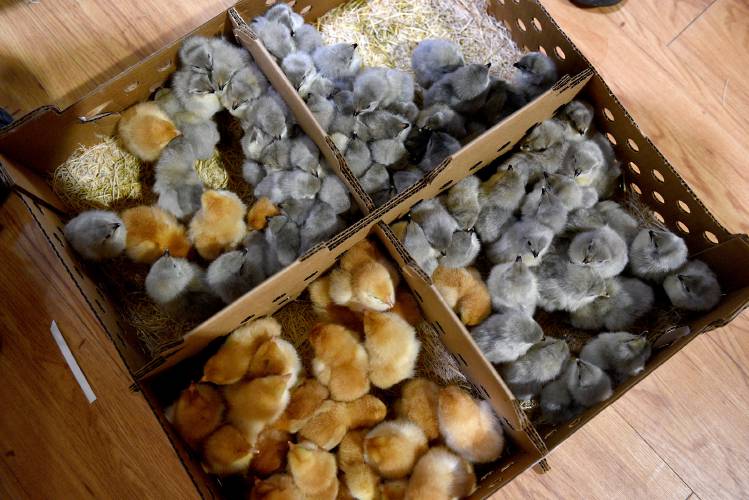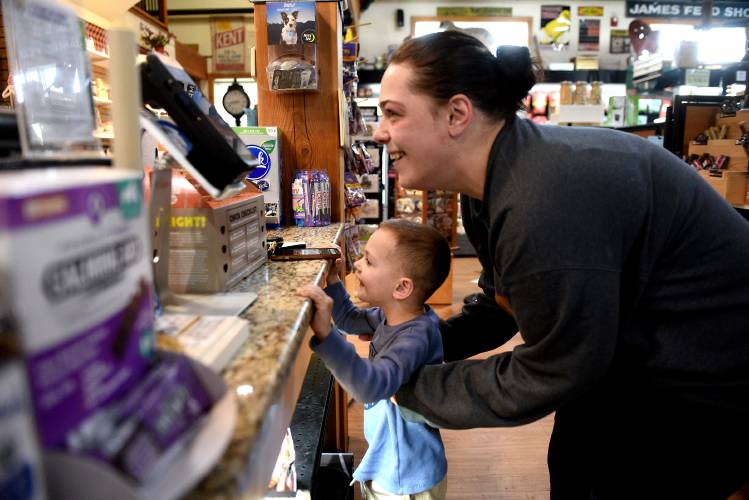High egg prices drive interest in raising backyard flocks
|
Published: 04-04-2025 5:15 PM
Modified: 04-05-2025 8:02 PM |
WEST LEBANON — On Thursday, the first of a seasonal series of monthly chick delivery days at West Lebanon Feed & Supply, a cacophony of chirps greeted customers as they stopped in to pick up their orders.
Three stacks of warming boxes held about 1,500 chicks that had made their way through the U.S. Postal Service from a hatchery in Ohio.
The size of the order was roughly double that of last April’s, store manager Chris Mazurick said. Of the 150 people who had pre-ordered chicks about a third of them were new customers.
Prices start at $4 a bird and go up to $10 for specialty breeds.
Sales of laying hens are higher than usual this spring as rising egg prices have prompted some Upper Valley residents to start or expand their own backyard flocks.
A spokesperson for Tractor Supply, which sells chicks at its stores in Lebanon and Claremont, said that the chain company is seeing “high demand for poultry” this year and expects to exceed last year’s sales of over 10 million live birds, nationally.
Taylor Hackett, of Hartford, stopped at Feed and Supply on Thursday afternoon to pick up her order of 20 birds. She’d been considering starting her own flock since the winter. “Egg prices went higher and higher,” she said. “We eat a dozen eggs for breakfast,” and the price spike was not sustainable for her family of four.
In New Hampshire, the average price of eggs reached an all-time high of almost $5 per dozen in February, according to the the U.S. Department of Labor Statistics. In February 2024, eggs were $2.50 a dozen.
Article continues after...
Yesterday's Most Read Articles
 Head-on crash in Hartland leaves one dead
Head-on crash in Hartland leaves one dead
 Hartford fitness trainer faces federal charges stemming from June drug bust
Hartford fitness trainer faces federal charges stemming from June drug bust
 Tai chi and chair yoga help seniors stay active and social
Tai chi and chair yoga help seniors stay active and social
 Friends and family mourn Hartford native Jamison O’Neil, expectant father and special educator
Friends and family mourn Hartford native Jamison O’Neil, expectant father and special educator
Thetford resident Joelle Rasor sells eggs at a roadside stand for $5 a dozen. She was at the Feed & Supply to pick up 20 chicks to add to her existing flock of 11 laying hens.
“We’ve been very successful,” Rasor said. “I can’t really keep up with the demand.”
Rasor thinks the increased demand at her farm stand is directly related to the escalated price of eggs in supermarkets. “No doubt,” she said. “Every time we put a dozen out it sells that same day.”
At the Four Aces Diner in West Lebanon, owner Leann Briggs purchases eggs by the case — 15 dozen — from wholesale food supplier Sysco. Not long ago, she paid $35 per case.
“Today it’s $67 for that same case,” she said.
When the diner recently ran low on eggs one day, Briggs purchased a case from a local retailer for more than $100, she said.
Briggs hasn’t raised the price of menu items, but to reduce waste, she’s working with the kitchen staff to keep portions a consistent size and limit order mix-ups.
“As long as I can hold the line, I’ll hold the line” on menu prices, she said.
While the price and fluctuating supply of eggs in supermarkets may have residents thinking about starting their own backyard flocks, that decision comes with start-up costs and potential risks.
“That first dozen eggs might cost a thousand dollars,” Martha Manning, a 4-H educator based in northern Vermont, said by phone Wednesday.
Depending on the breed of hen and the type of feed, it can take anywhere from 16 to 24 weeks before a chicken begins producing eggs.
“That initial outlay can be very expensive,” especially if it includes buying or building a coop, Manning said.
In addition to startup costs, municipal zoning ordinances and other restrictions may limit a residential farmer’s flock size. Then there are foxes and other predators to contend with.
On Thursday night, Pat Tower, of Barnard, lost 11 of her 15 birds to a predator attack — she thinks it was either a fox or coyotes.
Before the attack, Tower’s flock produced more eggs than her family needed, so the surplus was sold to neighbors. Although the birds are free-range, they are protected by the family’s two dogs. But for about an hour that night, they were left alone, and that’s when the predator struck.
“This is going to be a hard hit,” Tower said.
She expects to get an egg a day from the remaining birds “once their stress level goes down,” she said.
Tower had already ordered eight chicks this spring to supplement the flock, but it will take four or five months for them to start producing eggs.
Customers at West Lebanon Feed & Supply on Thursday said the costs and potential risks of raising a backyard flock were worth it.
“You end up paying more for home eggs, but they are better quality” than store-bought eggs, Hartland resident Katelyn Drake said.
With her flock of four aging and producing fewer eggs, she ordered six new chicks. “Grocery store eggs can be over a month old” at the time of purchase, she added.
Not everyone picking up chicks at Feed & Supply was primarily motivated by egg prices. “I like the idea of taking care of the little beasts; of nurturing them,” Lebanon resident Wanda Bachmann said as she waited for her order. “It’s entertaining.”
Bachman ordered four chicks — the maximum allowed by city ordinance in her residential neighborhood— and chose four different breeds. “I wanted a diverse crowd,” she said.
Mike Snow, a Post Mills farmer, said that he finds chickens “endearing.” He has a flock of about 300 and sells eggs as well as importing pullets — juvenile chickens — to sell locally.
“You get so much enjoyment out of it,” he said of raising chickens. “They are funny little creatures.”
Snow also relies on his flock to provide fertilizer for his crops.
“Our soil health is not what it used to be,” he said. Rotating the chickens from field to field improves the soil so that it absorbs and holds water better, which can help mitigate damage from storms.
Snow found the supply of chicks this year to be tighter than in the past. As larger buyers purchased in big quantities, he said, smaller farmers like him “sort of got the dregs.” Though he ordered 400 pullets, he was only able to purchase 350, due to supply limitations.
While outbreaks of avian flu have resulted in the destruction of large commercial flocks, hatcheries that supply laying hens on a smaller scale have been less impacted.
While the spread of avian flu has led to skyrocketing egg prices, Manning, the 4-H educator, said shortages of laying chicks might be more related to increased demand for backyard poultry flocks than a decreased supply of chickens.
Manning hasn’t seen the availability of baby chicks this tight, she said.”I don’t think it’s all due to avian flu,” she said. “The commercial flocks impacted by flu would not be specialty breeds,” or what she calls the “pretty birds” that customers often order for small household flocks.
“My guess is probably that the price of eggs has gone up, and people think that it is cheaper and more stable to have their own,” she added.
For Manning, the most important aspect of starting a flock for the first time is making informed decisions on the front end.
It is also important, she said, to keep backyard chickens away from migrating waterfowl such as ducks and geese, which may carry and transmit avian flu.
“The biggest thing is for people to do their homework and know what it will cost them to get in to poultry,” she said. An d to know that they can reach out to their coo perative extension program for help.
For more information on raising chickens, the University of Vermont Extension may be reached at: extension.info@uvm.edu or 802-656-2990. The Uni versity of New Hampshire Extension office may be reached at: 877-398-4769
Christina Dolan can be reached at cdolan@vnews.com or 603-727-3208.










 What do Trump’s latest tariffs mean for trade with Canada?
What do Trump’s latest tariffs mean for trade with Canada? Vermont Supreme Court decision adds to saga over closed store
Vermont Supreme Court decision adds to saga over closed store With crushing costs and too-few slots, child care strain grows for NH families
With crushing costs and too-few slots, child care strain grows for NH families Authorities release name of man shot by police in NH parking lot
Authorities release name of man shot by police in NH parking lot
